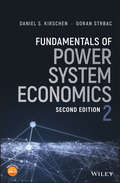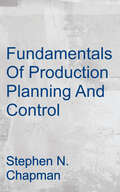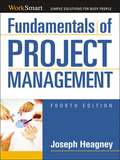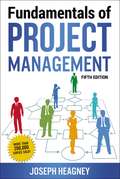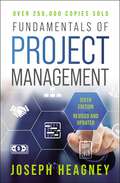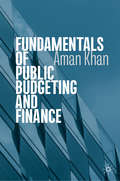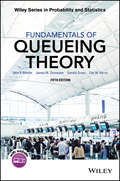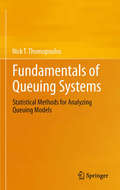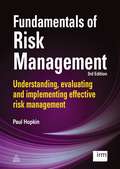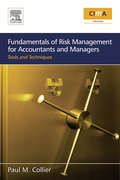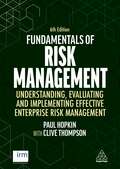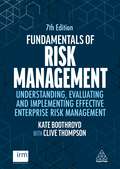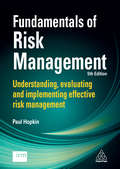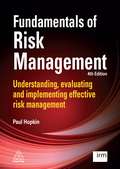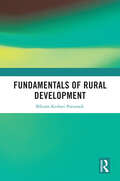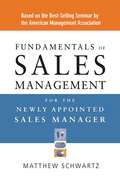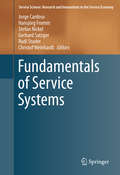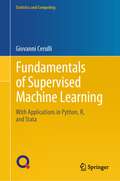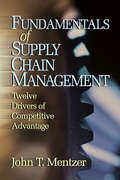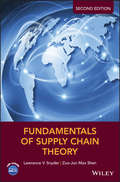- Table View
- List View
Fundamentals of Power System Economics
by Daniel S. Kirschen Goran StrbacA new edition of the classic text explaining the fundamentals of competitive electricity markets—now updated to reflect the evolution of these markets and the large scale deployment of generation from renewable energy sources The introduction of competition in the generation and retail of electricity has changed the ways in which power systems function. The design and operation of successful competitive electricity markets requires a sound understanding of both power systems engineering and underlying economic principles of a competitive market. This extensively revised and updated edition of the classic text on power system economics explains the basic economic principles underpinning the design, operation, and planning of modern power systems in a competitive environment. It also discusses the economics of renewable energy sources in electricity markets, the provision of incentives, and the cost of integrating renewables in the grid. Fundamentals of Power System Economics, Second Edition looks at the fundamental concepts of microeconomics, organization, and operation of electricity markets, market participants’ strategies, operational reliability and ancillary services, network congestion and related LMP and transmission rights, transmission investment, and generation investment. It also expands the chapter on generation investments—discussing capacity mechanisms in more detail and the need for capacity markets aimed at ensuring that enough generation capacity is available when renewable energy sources are not producing due to lack of wind or sun. Retains the highly praised first edition’s focus and philosophy on the principles of competitive electricity markets and application of basic economics to power system operating and planning Includes an expanded chapter on power system operation that addresses the challenges stemming from the integration of renewable energy sources Addresses the need for additional flexibility and its provision by conventional generation, demand response, and energy storage Discusses the effects of the increased uncertainty on system operation Broadens its coverage of transmission investment and generation investment Updates end-of-chapter problems and accompanying solutions manual Fundamentals of Power System Economics, Second Edition is essential reading for graduate and undergraduate students, professors, practicing engineers, as well as all others who want to understand how economics and power system engineering interact.
Fundamentals of Production Planning and Control
by Stephen ChapmanIntended for courses in Production, Planning and Control, or Inventory Management/Control. This exciting new text takes a concise, practical, survey approach. It surveys the fundamental principles of planning and control to give students the breadth of knowledge they need without excessive depth and detail. This excellent resource is written by an established authority on supply chain management and production and inventory control.
Fundamentals of Project Management (Worksmart Ser.)
by Joseph HeagneyWith sales of more than 160,000 copies, Fundamentals of Project Management has helped generations of project managers navigate the ins and outs of every aspect of this complex discipline. Using a simple step-by-step approach, the book is the perfect introduction to project management tools, techniques, and concepts. Readers will learn how to: • Develop a mission statement, vision, goals, and objectives • Plan the project • Create the work breakdown structure • Produce a workable schedule • Understand earned value analysis • Manage a project team • Control and evaluate progress at every stage. Fully updated based on the latest version of the Project Management Body of Knowledge (PMBOK®), the fourth edition contains new information and expanded coverage on the project risk plan; the change control process; the concept of the project manager as leader; and more. This up-to-the-minute guide is filled with tips and techniques for planning and executing projects on time, on budget, and with maximum efficiency.
Fundamentals of Project Management (Worksmart Ser.)
by Joseph HeagneyThis practical resource for managers explains how to keep projects and initiatives on track and get them completed on time and under budget. Consultant and trainer Lewis (The Lewis Institute) covers each step of the process, from developing goals and objectives through producing a workable schedule, managing the project team, and conducting periodic reviews. The third edition features new information on risk management and a discussion of the hazards of estimating time, costs, and resources. Annotation ©2007 Book News, Inc. , Portland, OR (booknews. com)
Fundamentals of Project Management, Sixth Edition
by Joseph HeagneyFor close to three decades, Fundamentals of Project Management has helped people tackle the complexities of the job. Succinct and easy to read, the book simplifies concepts, answers questions, and helps tame the chaos that can erupt as projects move from planning to completion.The Sixth Edition of this trusted bestseller offers the practical guidelines and tools project managers have come to expect, along with new information explaining changes to the PMBOK® Guide, 7th Edition. Updated tools, techniques, examples, and exercises clearly explain how to:Clarify project goals and objectivesManage stakeholders in the planning processForm a project risk planCreate a communication plan(NEW) Leverage current post-pandemic project trends(NEW) Identify challenges leading virtual project teamsUse a work breakdown structureDevelop solid estimates(NEW) Leverage different technologies to support virtual work(NEW) Maximize communication in the absence of visual cluesProduce a workable scheduleImprove procurement managementManage change requestsLead the project team effectivelyControl and evaluate progress at every stageClose the project and review lessons learned(NEW) Create and sustain trust in a virtual team(NEW) Manage project recovery when crises hit(NEW) Avoid the faulty fix(NEW) Execute the project reset(NEW) Manage the risk of project recoveryAnd moreProject mishaps are all too common, but often easy to avoid. With its practical, step-by-step approach, this book gets both new and experienced managers up to speed on the fundamentals—the first crucial step for completing projects on time and on budget.
Fundamentals of Psychodrama
by Falko von Ameln Jochen Becker-EbelThis book offers a comprehensive guide to psychodrama, including the underlying philosophy, methodology, theory and applications. Taking readers through the process of staging a psychodrama session, from the contracting phase, exploration and enactment to closure and integration, the book also presents brief short examples to illustrate how to choose the best methodological approach for any context, and describes in detail the various psychodrama techniques and their application in practice, with indications, contraindications, typical pitfalls and FAQs. The book demonstrates that psychodrama is not merely a collection of methods and techniques and that the potential of psychodrama cannot be fully utilized without an in-depth knowledge of its conceptual foundations. With examples from a range of practices, it shows the broad applicability of psychodrama in therapeutic and non-therapeutic contexts alike, e.g. in educational contexts (school and adult education), social work, organization development, coaching and many other fields. This easy-to-read book uses jargon-free language and will appeal to psychotherapy researchers and practitioners, as well as non-therapeutic professionals like human resource consultants and life coaches. This is a translated and revised edition of the best-selling German book Psychodrama: Grundlagen (Springer, 2014, 3rd edition).
Fundamentals of Public Budgeting and Finance
by Aman KhanBudgeting is probably the single most important function in government, considering the amount of money a government spends each year on various expenditure programs and activities, as well as the time it spends in preparing the budget, appropriating funds for these activities and, finally, executing them. This book integrates the complex theory and practice of public budgeting into a single text. Written in a simple, concise and easy to understand manner, The Fundamentals of Public Budgeting and Finance captures the multidimensional perspective of public budgeting that students, as well as practitioners will find useful.
Fundamentals of Public Budgeting and Finance
by Aman KhanBudgeting is arguably the single most important function in government. Every year governments spend considerable sums on expenditure programs and activities, as well as time preparing and executing the budget. It is therefore crucial that anyone interested in a career in public administration has a fundamental grasp of these basics. This second edition textbook integrates theory and practice of public budgeting into a single volume. The first part introduces the background to budgeting, focusing especially on taxation, government expenditure and revenue. The second part focuses on budgeting basics, in particular operating and capital budget. The final part deals with budgeting tools, especially those related to capital rationing, budget forecasting, and analyzing government revenue and expenditure. Written in a concise and easy to understand manner, this book captures the multidimensional nature of public budgeting that both students and practitioners will find useful. This second edition has been fully revised and updated, as well as expanded to include new material and exercises. It will appeal to all those studying public administration, financial management and public budgeting.
Fundamentals of Queueing Theory (Wiley Series in Probability and Statistics)
by Donald Gross John F. Shortle Carl M. Harris James M. ThompsonThoroughly updated and expanded to reflect the latest developments in the field, Fundamentals of Queueing Theory, Fifth Edition presents the statistical principles and processes involved in the analysis of the probabilistic nature of queues. Rather than focus narrowly on a particular application area, the authors illustrate the theory in practice across a range of fields, from computer science and various engineering disciplines to business and operations research. Critically, the text also provides a numerical approach to understanding and making estimations with queueing theory and provides comprehensive coverage of both simple and advanced queueing models. As with all preceding editions, this latest update of the classic text features a unique blend of the theoretical and timely real-world applications. The introductory section has been reorganized with expanded coverage of qualitative/non-mathematical approaches to queueing theory, including a high-level description of queues in everyday life. New sections on non-stationary fluid queues, fairness in queueing, and Little’s Law have been added, as has expanded coverage of stochastic processes, including the Poisson process and Markov chains.
Fundamentals of Queuing Systems
by Nick T. ThomopoulosWaiting in lines is a staple of everyday human life. Without really noticing, we are doing it when we go to buy a ticket at a movie theater, stop at a bank to make an account withdrawal, or proceed to checkout a purchase from one of our favorite department stores. Oftentimes, waiting lines are due to overcrowded, overfilling, or congestion; any time there is more customer demand for a service than can be provided, a waiting line forms. Queuing systems is a term used to describe the methods and techniques most ideal for measuring the probability and statistics of a wide variety of waiting line models. This book provides an introduction to basic queuing systems, such as M/M/1 and its variants, as well as newer concepts like systems with priorities, networks of queues, and general service policies. Numerical examples are presented to guide readers into thinking about practical real-world applications, and students and researchers will be able to apply the methods learned to designing queuing systems that extend beyond the classroom. Very little has been published in the area of queuing systems, and this volume will appeal to graduate-level students, researchers, and practitioners in the areas of management science, applied mathematics, engineering, computer science, and statistics.
Fundamentals of Real Estate Appraisal
by Martha Williams William VentoloFundamentals of Real Estate Appraisal is a classic text in the field, first published in 1975 and still updated by the original authors. The latest edition of this best-selling text provides a strong foundation for understanding the modern real estate appraisal market. New discussion includes the modern appraisal office, gross living area, the division of outdoor spaces, the concept of curb appeal, interior house design, landscaping plans, Historical Landmark Designation, retrospective value, and financial calculators. This edition includes learning objectives and unit review questions. Additionally, this text covers the basic principles and procedures requirements of the Appraiser Qualifications Board.
Fundamentals of Risk Management
by Paul Hopkin Institute of Risk ManagementFundamentals of Risk Management provides a comprehensive introduction to the subject of commercial and business risk, examining the key components of risk management and its application. With relevant examples for both the private and public sector, this third edition is completely aligned to ISO 31000 and provides enhanced best practice advice on assessing and managing risk appetite to enhance company resilience. Exploring the different types of risk an organization faces, including hazard risks and uncertainties, it provides the core concepts of business continuity planning, enterprise risk management and project risk management. Also including a thorough overview of the international risk management standards and frameworks, strategy and policy, Fundamentals of Risk Management is the definitive text for emerging professionals and anyone studying on a risk management course.
Fundamentals of Risk Management for Accountants and Managers
by Paul M. CollierBoth financial and non-financial managers with accountability for performance at either a strategic level or for a business unit have responsibility for risk management, in terms of failing to achieve organisational objectives.Fundamentals of Enterprise Risk management is structured around four parts and 26 self-contained chapters. Each chapter will have ample practical examples and illustrations/mini-case studies from retail, manufacturing and service industries and from the public and not-for-profit sectors to enable the reader to understand and apply the concepts in the book.
Fundamentals of Risk Management: Understanding, Evaluating and Implementing Effective Enterprise Risk Management
by Paul Hopkin Clive ThompsonEffective risk management allows opportunities to be maximized and uncertainty to be minimized. This guide for emerging professionals provides a comprehensive understanding of risk management with tools, tips and tactics on how to offer expert insights and drive success.Fundamentals of Risk Management is a detailed and comprehensive introduction to commercial and business risk for students and risk professionals. Completely aligned with ISO 31000 and the COSO ERM Framework, this book covers the key principles of risk management and how to deal with the different types of risk organizations face. The frameworks of business continuity planning, enterprise risk management, and project risk management are covered alongside an overview of international risk management standards and frameworks, strategy and policy.The revised sixth edition includes updates throughout as well as providing new content on trends such as cyber risk, black swan events and climate risk. Supported by relevant international case examples including BP, Singapore Airlines and Darktrace, this book provides a full analysis of changes in contemporary risk areas including digital risk management, risk culture and appetite, supply chain and statutory risk reporting. Supporting online resources include lecture slides with figures, tables and key points from the book.
Fundamentals of Risk Management: Understanding, Evaluating and Implementing Effective Enterprise Risk Management
by Clive Thompson Kate BoothroydFundamentals of Risk Management provides a comprehensive introduction to enterprise risk for students and risk professionals, with tools and tips, expert insights and coverage of key developments in an ever-evolving field.Effective enterprise risk management allows organizations to maximize opportunities and minimize uncertainty. Aligned with ISO 31000, the COSO ERM Framework and the UK's Orange Book, this guide covers the key principles of risk management and how to deal with the different types of risk that organizations face. The frameworks of business continuity planning, enterprise risk management and project risk management are covered alongside an overview of international risk management standards and frameworks, strategy and policy. The text provides a clear introduction to a variety of risk management approaches used in sectors such as insurance, banking, law, health and safety and supply chain management.Now in its seventh edition, Fundamentals of Risk Management guides readers through the steps of risk identification, risk analysis, risk description and risk estimation. It includes new chapters covering emerging trends in risk management such as resilience, sustainability and strategic risk. It offers increased international coverage around corporate governance and real-world examples, allowing students to connect theory to practice. Supporting online resources include lecture slides with figures, tables and key points from the book.
Fundamentals of Risk Management: Understanding, Evaluating and Implementing Effective Risk Management
by Paul HopkinThis fifth edition of Fundamentals of Risk Management is a comprehensive introduction to commercial and business risk for students and risk professionals. Providing extensive coverage of the core frameworks of business continuity planning, enterprise risk management and project risk management, this is the definitive guide to dealing with the different types of risk an organization faces. With relevant international case examples including Ericsson, Network Rail and Unilever, the book provides a full analysis of changes in contemporary risk areas including supply chain, cyber risk, risk culture and appetite, improvements in risk management documentation and statutory risk reporting.Now revised to be completely aligned with the recently updated ISO 31000 and COSO ERM Framework, this comprehensive text reflects developments in regulations, reputation risk, loss control and the value of insurance as a risk management method. Also including a thorough overview of international risk management standards and frameworks, strategy and policy, Fundamentals of Risk Management is the definitive text for those beginning or considering a career in risk.
Fundamentals of Risk Management: Understanding, evaluating and implementing effective risk management
by Paul HopkinFundamentals of Risk Management, now in its fourth edition, is a comprehensive introduction to commercial and business risk for students and a broad range of risk professionals. Providing extensive coverage of the core frameworks of business continuity planning, enterprise risk management and project risk management, this is the definitive guide to dealing with the different types of risk an organization faces. With relevant international case examples from both the private and public sectors, this revised edition of Fundamentals of Risk Management is completely aligned to ISO 31000 and provides a full analysis of changes in contemporary risk areas including supply chain, cyber risk, risk culture and improvements in risk management documentation and statutory risk reporting. Fundamentals of Risk Management has been fully updated to reflect the development of risk management standards and practice, in particular business continuity standards, regulatory developments, risks to reputation and the business model, changes in enterprise risk management (ERM), loss control and the value of insurance as a risk management method. Also including a thorough overview of the international risk management standards and frameworks, strategy and policy, this book is the definitive professional text for risk managers.
Fundamentals of Rural Development
by Bikram Keshari PattanaikThe book expounds on the functioning of rural development as well as the practical problems encountered in the formulation of rural development policies and programmes. It provides an exhaustive account of the various sectors and actors of rural development and presents it as a multidimensional concept by documenting its different components. It also details the paradigms and strategies of rural development adopted by developed and developing countries of the world.This volume deals with rural cooperatives and livelihood in order to understand how the development process can be self-sustained and sustainable, following the vocal for local mantra. It also extensively discusses rural basic needs, poverty, employment, the role of Panchayati Raj institutions, the corporate sector, NGOs, peoples’ participation, and capacity building in rural development.This book will be useful to undergraduate and postgraduate students, researchers, and teachers of development studies, economics, sociology, political science, and public administration. It will be useful for the administrators and development administration officials of state and central government, planners, policymakers, and people working in NGOs and corporate sector functionaries dealing with corporate social responsibilities especially those handling developmental issues and challenges.
Fundamentals of Sales Management for the Newly Appointed Sales Manager
by Matthew SchwartzThis invaluable resource helps you understand what it takes to be a great sales manager, allowing you to avoid many of the common first-time sales management mistakes, and be successful right out of the gate.Making the leap into sales management means meeting a whole new set of challenges. As a manager, you&’re going to have to quickly develop the skills that allow you to build and supervise a sales team, communicate effectively, set goals, be a mentor, and much, much more. Now that you&’ve been handed these unfamiliar responsibilities, you&’re going to have to think on your feet -- or face the possibility of not living up to expectations.Dispensing with dry theory, Fundamentals of Sales Management for the Newly Appointed Sales Manager helps you understand your new role in the organization, and how to thrive simultaneously as both a member of the management team and as a team leader. You&’ll learn how to:Make a smooth transition into managementBuild a superior, high-functioning sales teamSet objectives and plan performanceDelegate responsibilitiesRecruit new employeesImprove productivity and effectivenessThis book supplies you with indispensable, need-to-know information on communicating with your team, your bosses, your peers, and your customers; developing a sales plan and understanding the relationship between corporate, department, and individual plans; applying crucial time management skills to your new role; managing a sales territory; interviewing and hiring the right people; building a motivational environment; compensating your people; and understanding the difference between training, coaching, and counseling?and knowing how to excel at each.
Fundamentals of Service Systems
by Rudi Studer Christof Weinhardt Jorge Cardoso Hansjörg Fromm Stefan Nickel Gerhard SatzgerThis textbook addresses the conceptual and practical aspects of the various phases of the lifecycle of service systems, ranging from service ideation, design, implementation, analysis, improvement and trading associated with service systems engineering. Written by leading experts in the field, this indispensable textbook will enable a new wave of future professionals to think in a service-focused way with the right balance of competencies in computer science, engineering, and management. Fundamentals of Service Systems is a centerpiece for a course syllabus on service systems. Each chapter includes a summary, a list of learning objectives, an opening case, and a review section with questions, a project description, a list of key terms, and a list of further reading bibliography. All these elements enable students to learn at a faster and more comfortable peace. For researchers, teachers, and students who want to learn about this new emerging science, Fundamentals of Service Systems provides an overview of the core disciplines underlying the study of service systems. It is aimed at students of information systems, information technology, and business and economics. It also targets business and IT practitioners, especially those who are looking for better ways of innovating, designing, modeling, analyzing, and optimizing service systems.
Fundamentals of Space Business and Economics
by Ozgur GurtunaThis book provides an overview of key topics related to space business and management. Case studies and an integrative section are included to illustrate the fundamental concepts and to build intuition. Key topics in the field, such as risk management and cost management, are covered in detail.
Fundamentals of Statistics for Aviation Research (Aviation Fundamentals)
by Michael A. Gallo Brooke E. Wheeler Isaac M. SilverThis is the first textbook designed to teach statistics to students in aviation courses. All examples and exercises are grounded in an aviation context, including flight instruction, air traffic control, airport management, and human factors. Structured in six parts, this book covers the key foundational topics relative to descriptive and inferential statistics, including hypothesis testing, confidence intervals, z and t tests, correlation, regression, ANOVA, and chi-square. In addition, this book promotes both procedural knowledge and conceptual understanding. Detailed, guided examples are presented from the perspective of conducting a research study. Each analysis technique is clearly explained, enabling readers to understand, carry out, and report results correctly. Students are further supported by a range of pedagogical features in each chapter, including objectives, a summary, and a vocabulary check. Digital supplements comprise downloadable data sets and short video lectures explaining key concepts. Instructors also have access to PPT slides and an instructor’s manual that consists of a test bank with multiple choice exams, exercises with data sets, and solutions. This is the ideal statistics textbook for aviation courses globally, especially in aviation statistics, research methods in aviation, human factors, and related areas.
Fundamentals of Supervised Machine Learning: With Applications in Python, R, and Stata (Statistics and Computing)
by Giovanni CerulliThis book presents the fundamental theoretical notions of supervised machine learning along with a wide range of applications using Python, R, and Stata. It provides a balance between theory and applications and fosters an understanding and awareness of the availability of machine learning methods over different software platforms.After introducing the machine learning basics, the focus turns to a broad spectrum of topics: model selection and regularization, discriminant analysis, nearest neighbors, support vector machines, tree modeling, artificial neural networks, deep learning, and sentiment analysis. Each chapter is self-contained and comprises an initial theoretical part, where the basics of the methodologies are explained, followed by an applicative part, where the methods are applied to real-world datasets. Numerous examples are included and, for ease of reproducibility, the Python, R, and Stata codes used in the text, along with the related datasets, are available online.The intended audience is PhD students, researchers and practitioners from various disciplines, including economics and other social sciences, medicine and epidemiology, who have a good understanding of basic statistics and a working knowledge of statistical software, and who want to apply machine learning methods in their work.
Fundamentals of Supply Chain Management: Twelve Drivers of Competitive Advantage
by John T. MentzerAuthor of the bestselling text Supply Chain Management, John T. Mentzer's companion book Fundamentals of Supply Chain Management: Twelve Drivers of Competitive Advantage has been developed as a supplemental text for any course dealing with strategy and supply chains. Written in an entertaining, accessible style, Mentzer identifies twelve drivers of competitive advantage as clear strategic points managers can use in their companies. Research from more than 400 books, articles, and papers, as well as interviews with over fifty executives in major global companies, inform these twelve drivers. The roles of all of the traditional business functions—marketing, sales, logistics, information systems, finance, customer services, and management—in supply chain management are also addressed.
Fundamentals of Supply Chain Theory
by Lawrence V. Snyder Zuo-Jun Max ShenComprehensively teaches the fundamentals of supply chain theory This book presents the methodology and foundations of supply chain management and also demonstrates how recent developments build upon classic models. The authors focus on strategic, tactical, and operational aspects of supply chain management and cover a broad range of topics from forecasting, inventory management, and facility location to transportation, process flexibility, and auctions. Key mathematical models for optimizing the design, operation, and evaluation of supply chains are presented as well as models currently emerging from the research frontier. Fundamentals of Supply Chain Theory, Second Edition contains new chapters on transportation (traveling salesman and vehicle routing problems), integrated supply chain models, and applications of supply chain theory. New sections have also been added throughout, on topics including machine learning models for forecasting, conic optimization for facility location, a multi-supplier model for supply uncertainty, and a game-theoretic analysis of auctions. The second edition also contains case studies for each chapter that illustrate the real-world implementation of the models presented. This edition also contains nearly 200 new homework problems, over 60 new worked examples, and over 140 new illustrative figures. Plentiful teaching supplements are available, including an Instructor’s Manual and PowerPoint slides, as well as MATLAB programming assignments that require students to code algorithms in an effort to provide a deeper understanding of the material. Ideal as a textbook for upper-undergraduate and graduate-level courses in supply chain management in engineering and business schools, Fundamentals of Supply Chain Theory, Second Edition will also appeal to anyone interested in quantitative approaches for studying supply chains. Lawrence V. Snyder, PhD, is Professor in the Department of Industrial and Systems Engineering and Co-Director of the Institute for Data, Intelligent Systems, and Computation at Lehigh University. He has written numerous journal articles and tutorials on optimization models for supply chains and other infrastructure systems, with a focus on decision-making under uncertainty. Zuo-Jun Max Shen, PhD, is Professor in the Department of Industrial Engineering and Operations Research and the Department of Civil and Environmental Engineering at the University of California at Berkeley. He is an INFORMS Fellow and has published and consulted extensively in the areas of integrated supply chain design and management, data driven decision making, and systems optimization.
